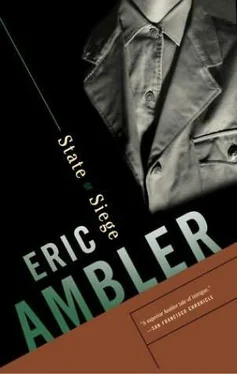Eric Ambler - State of Siege
Здесь есть возможность читать онлайн «Eric Ambler - State of Siege» весь текст электронной книги совершенно бесплатно (целиком полную версию без сокращений). В некоторых случаях можно слушать аудио, скачать через торрент в формате fb2 и присутствует краткое содержание. Год выпуска: 1956, ISBN: 1956, Издательство: Berkley, Жанр: Криминальный детектив, на английском языке. Описание произведения, (предисловие) а так же отзывы посетителей доступны на портале библиотеки ЛибКат.
- Название:State of Siege
- Автор:
- Издательство:Berkley
- Жанр:
- Год:1956
- ISBN:9780425067680
- Рейтинг книги:3 / 5. Голосов: 1
-
Избранное:Добавить в избранное
- Отзывы:
-
Ваша оценка:
- 60
- 1
- 2
- 3
- 4
- 5
State of Siege: краткое содержание, описание и аннотация
Предлагаем к чтению аннотацию, описание, краткое содержание или предисловие (зависит от того, что написал сам автор книги «State of Siege»). Если вы не нашли необходимую информацию о книге — напишите в комментариях, мы постараемся отыскать её.
State of Siege — читать онлайн бесплатно полную книгу (весь текст) целиком
Ниже представлен текст книги, разбитый по страницам. Система сохранения места последней прочитанной страницы, позволяет с удобством читать онлайн бесплатно книгу «State of Siege», без необходимости каждый раз заново искать на чём Вы остановились. Поставьте закладку, и сможете в любой момент перейти на страницу, на которой закончили чтение.
Интервал:
Закладка:
Early one morning about three months before I was due to leave, Mulder drove into the camp with the news that Smit and his wife had been murdered.
The first part of the story was easily told. At one o’clock that morning, Mulder and his wife had been wakened by the Smits’ eldest son, a boy of sixteen. He said that two men had driven up to the bungalow half an hour earlier and battered on the door until they were admitted. The noise had wakened him. He had heard his father speaking to them and there had been an argument. His father had become angry. Suddenly, there had been four shots. His mother had screamed and more shots had been fired. The men had then driven away. His mother and father were wounded. He had left the ayah to look after them and run for help.
By the time Mulder had arrived at the bungalow, Smit was dead. The wife had died shortly afterwards. Later, he had taken the children and their ayah back with him to his bungalow. Fearing for the safety of his own family, he had stayed with them until daylight before driving up to the camp to ask us to report the matter by radio to the police at Port Kail.
From the way he told it, it was fairly obvious that he knew more than he was saying. When I got him alone and had promised to keep my mouth shut, he told me the rest.
A week earlier two Sundanese had come to see him with a proposal. They said that they knew that he was smuggling rubber out of the country and being paid for it in Straits dollars. They wanted a half share in the proceeds of all future consignments. If they did not get it, unpleasant things would happen both to his family and to him. They would give him two days to think it over. Meanwhile, he was to tell nobody.
He went to Smit and found that the men had been to see him also. The two planters discussed the situation carefully. They knew that they were helpless. There was, of course, no question of their appealing for police protection. Apart from the fact that they would have to admit to the smuggling, which for Dutchmen would be suicidal, there was also the possibility that the men themselves might be connected with the police. They decided, in the end, to pay up, but to bargain first. They thought that an offer of ten per cent might satisfy the men.
It did not. The men became angry. They gave Mulder a further twenty-four hours to agree, and also demanded two thousand Straits dollars in cash as an earnest of his intentions.
That had been the previous night. The men must have gone straight to Smit, realised from what he said that the victims had been consulting together, and decided to show Mulder that they meant business. They had succeeded. Mulder was ready now to give them his whole estate if they asked for it.
But I was still a bit puzzled. Smit had not been the sort of man who is easily intimidated. It was difficult to think of his opening the door to a couple of thugs in the middle of the night without a loaded gun in his hand. As for Mulder; if he had asked me to help him to ambush the two men and leave their bodies for the kites, I should not have been greatly surprised.
It was not until I had persuaded him to talk about the two men that I understood. It would have been death to touch either of them. They were Sundanese army officers, a major and a captain. The descriptions that he gave left me in no doubt as to their identity. I persuaded Mulder to go with me to Gedge and repeat the story.
That night when Major Idrus and Captain Kerani arrived at Mulder’s bungalow, Gedge and I were waiting behind the screen doors into the bedroom. We heard them describe what they had done to Smit and his wife, and threaten Mulder with the same treatment if he did not pay. Then we came out armed with shotguns and a shorthand record of what we had heard. For a while the air was thick with protestations. In the end, however, a deal was made. If Major Idrus and Captain Kerani left Mulder alone, we would take no further action. Mulder would lodge our signed statements at his bank, so that if anything happened to him the statements would go to the police. It was a miserable arrangement, but, short of involving Mulder in police inquiries, it was the best that we could do. Idrus and Kerani were smiling when they left to drive back to the camp in a supply-department truck. They had reason to smile; they had got away with murder.
We stayed behind with Mulder for a while and drank too much gin. For Gedge it did not improve the occasion.
“How would you like to stay on here, Steve?” he asked suddenly as I drove the jeep back to the camp.
“What do you mean?”
“You can have my job if you like.”
“No, thanks.”
“Wise man. It’s not going to be pleasant having murderers about the place.”
“Understanding is a fine thing,” I said; “but sometimes it is better to carry a revolver.”
“What’s that?”
“Something that Major Suparto said.”
And now I was sitting in Gedge’s office for the last time, listening to what was being said, yet knowing that in less than three hours what I was hearing would seem as remote as a dream.
Unlike his five brother officers, Suparto had been an unqualified success. The ability to plan and organise is rare among the Sundanese; but, in this respect, Suparto was exceptional by any standards. Secure in a two-year contract, the Transport Manager had no qualms at all about delegating authority to so able and energetic an assistant, and had resisted the efforts of other departmental managers to lure him away.
Suparto had outlined the situation crisply.
There had been a strike of stevedores down at Port Kail the previous week and some important machinery had been unloaded on to the quayside by the ship’s crew. Now, the Customs people were making difficulties about identifying the individual items on the ship’s cargo manifest, and were refusing to clear it. In his opinion they were turning a small confusion into a big one in the hope of getting a substantial bribe. He believed that if he were to go down to Kail and see the head of the Customs himself, the problem would very soon disappear. The Transport Manager shared that belief.
“We’ve never had trouble with the Customs before,” Gedge was saying; “even in the early days when they could have made things good and tough for us.”
“Major Suparto thinks that the local men may be getting squeezed from above,” the Transport Manager said.
“I think it is possible,” said Suparto; “but that is not something which can be discovered by radio telephone. I must talk with these men privately.”
Gedge nodded. “Very well, Major. We’ll leave it to you. The main thing is to get that machinery on its way up here. How long will you be away?”
“Two days, perhaps three. I propose to leave at once.” He turned to me. “Mr. Fraser, I shall not have another opportunity. May I wish you a safe journey and a happy future?”
“Thanks, Major. It’s been a pleasure knowing you.”
We shook hands and he went out with the Transport Manager. Then began the rather more elaborate business of saying goodbye to Gedge.
The Dakota arrived at twelve thirty. When they had off-loaded the two mailbags, some cartons of dried milk and a couple of small air-compressor sets, they put my suitcase aboard and slung the outgoing mail in after it. My successor and one or two particular friends had come out to the airstrip to see me off, so there was more nonsense to be talked and handshaking to be done before I could get aboard myself.
Roy Jebb was the pilot. The first officer was a Sundanese named Abdul. They never carried a full crew on those trips, so, as I was the only passenger, I sat in the radio operator’s seat just behind them. The plane had been standing in the sun for an hour and was suffocatingly hot inside; but I was so glad to be going that I did not even think to take my jacket off. I could see the men who had been seeing me off walking back to where the jeeps were standing, and wondered vaguely if I would ever see any of them again. Then the sweat began to trickle into my eyes and Jebb called to me to fasten my seat belt.
Читать дальшеИнтервал:
Закладка:
Похожие книги на «State of Siege»
Представляем Вашему вниманию похожие книги на «State of Siege» списком для выбора. Мы отобрали схожую по названию и смыслу литературу в надежде предоставить читателям больше вариантов отыскать новые, интересные, ещё непрочитанные произведения.
Обсуждение, отзывы о книге «State of Siege» и просто собственные мнения читателей. Оставьте ваши комментарии, напишите, что Вы думаете о произведении, его смысле или главных героях. Укажите что конкретно понравилось, а что нет, и почему Вы так считаете.












